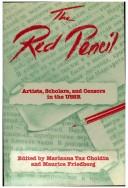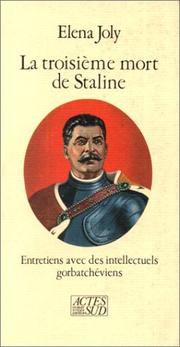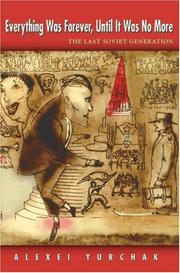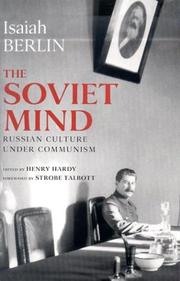| Listing 1 - 10 of 14 | << page >> |
Sort by
|
Book
ISBN: 0691094594 1306986214 0691602301 1400861136 9781400861132 0691631832 Year: 1990 Publisher: Princeton, New Jersey : Princeton University Press,
Abstract | Keywords | Export | Availability | Bookmark
 Loading...
Loading...Choose an application
- Reference Manager
- EndNote
- RefWorks (Direct export to RefWorks)
In this unprecedented work on the status and role of intellectuals in Soviet political life, a former Soviet sociologist maps out the delicate, often paradoxical, ties between the political regime and the creative thinkers who play a major part in the movement toward modernization. Beginning with Stalin, Vladimir Shlapentokh explores the mutual need and antagonism that have existed between political leaders and intellectuals. What emerges is a fascinating portrayal of the Soviet intellectual network since the 1950s, which touches on such topics as the role of literature and film in political opposition, levels of opposition (open, legal, and private), and the spread of paranoia as fueled by the KGB. Throughout he shows how the intellectual communityusually a cohesive, liberal grouphas fared under Khrushchev's cautious tolerance, Brezhnev's repressions, and now Gorbachev's Glasnost.Shlapentokh maintains, however, that under Glasnost freer speech has revealed a more pronounced divergence between liberal and conservative thinkers, and has allowed for open conservative opposition to the reformatory measures of Gorbachev and the liberals. He argues that one of the strongest checks on reform is the growing presence of Russophilism--a movement supporting Russian nationalism and Stalin's concept of socialism--among the political elite and the masses. Although the role of the liberal intellectuals in the late 1980s was less prominent than it was in the 1960s, Shlapentokh asserts that they remain the major agent of modernization in the Soviet Union, as well as in other socialist countries.Originally published in 1990.The Princeton Legacy Library uses the latest print-on-demand technology to again make available previously out-of-print books from the distinguished backlist of Princeton University Press. These editions preserve the original texts of these important books while presenting them in durable paperback and hardcover editions. The goal of the Princeton Legacy Library is to vastly increase access to the rich scholarly heritage found in the thousands of books published by Princeton University Press since its founding in 1905.
Soviet Union -- Intellectual life. --- Soviet Union -- Politics and government -- 1953-1985. --- Soviet Union -- Politics and government -- 1985-1991. --- Soviet Union --- Intellectual life. --- Politics and government --- Intellectual life --- From 1917 --- 1953-1985 --- 1986 --- -Soviet Union - Intellectual life - 1917 --- -Soviet nion - Politics and government - 1953-1985. --- Soviet Union - Politics and government - 1986 --- -Soviet Union --- HISTORY / Russia & the Former Soviet Union. --- -HISTORY / Russia & the Former Soviet Union. --- Soviet Union - Intellectual life - 1917
Book
ISBN: 9782713228216 2713228212 Year: 2020 Volume: 91 Publisher: Paris: École des hautes études en sciences sociales,
Abstract | Keywords | Export | Availability | Bookmark
 Loading...
Loading...Choose an application
- Reference Manager
- EndNote
- RefWorks (Direct export to RefWorks)

ISBN: 0044452039 Year: 1989 Publisher: Boston London Wellington Unwin Hyman
Abstract | Keywords | Export | Availability | Bookmark
 Loading...
Loading...Choose an application
- Reference Manager
- EndNote
- RefWorks (Direct export to RefWorks)
Book
ISSN: 09859632 ISBN: 9782701147888 2701147883 Year: 2008 Volume: *3 Publisher: [Paris]: Belin,
Abstract | Keywords | Export | Availability | Bookmark
 Loading...
Loading...Choose an application
- Reference Manager
- EndNote
- RefWorks (Direct export to RefWorks)
Politics and literature --- Russian literature --- Communism and literature --- Ideology and literature --- History and criticism --- Political aspects --- History --- Soviet Union --- Intellectual life --- Ideology and literature. --- History and criticism. --- Political aspects. --- History. --- Intellectual life. --- Politics and literature - Soviet Union --- Russian literature - 20th century - History and criticism --- Russian literature - 20th century - Political aspects --- Communism and literature - Soviet Union - History --- Soviet Union - Intellectual life
Book
ISBN: 9782070137022 2070137023 9782070140954 9782070141319 2070140954 2070141314 Year: 2013 Volume: 388, 400-401 Publisher: Paris: Gallimard,
Abstract | Keywords | Export | Availability | Bookmark
 Loading...
Loading...Choose an application
- Reference Manager
- EndNote
- RefWorks (Direct export to RefWorks)
A côté des noms de Soljenitsyne et de Pasternak, celui de Mandelstam est de ceux qui évoquent la résistance de l'esprit contre le terrorisme stalinien. C'est l'air de la liberté qu'on respire dans ce livre étouffant dont le manuscrit, rédigé sans doute en 1964, est parvenu clandestinement aux Etats-Unis sous le simple titre de "Souvenirs". Les souvenirs commencent en 1934, lors de la première arrestation d'Ossip Mandelstam, et évoquent ses trois années d'exil à Voronej. Ils s'achèvent avec la mort du poète, dans un wagon de déportation en Sibérie, un jour incertain de 1938. Mais, à l'intérieur de ce cadre, Nadejda Mandelstam, sans jamais parler d'elle-même, évoque de la façon la plus vivante toute une génération intellectuelle et politique, de Boukharine à Akhmatova, de Pasternak à Chklovski , et sa rapide réduction au silence dans les années 1920-1930. A ce titre, cet ouvrage ne constitue pas seulement le commentaire le plus autorisé sur les années les plus dramatiques et les plus fécondes de celui qui est unanimement considéré comme le plus grand poète russe du XXe siècle, mais un témoignage exceptionnel sur l'asphyxie de la culture russe qui a accompagné la prise de pouvoir par Staline. La sincérité de l'accent, sa simplicité tragique, sa dignité, son humour donnent son plein sens au prénom dont l'auteur avait fait sa devise : Nadejda signifie en russe "espérance".
Communism and intellectuals --- Poets, Russian --- Communisme et intellectuels --- Poètes russes --- Biography --- Biographies --- Mandel'shtam, Osip, --- Mandel'shtam, Nadezhda, --- Soviet Union --- URSS --- Intellectual life --- Vie intellectuelle --- Mandelshtam, Osip, --- Politics and government --- Poètes russes --- Mandelʹshtam, Osip, --- Mandelʹshtam, Nadezhda, --- Mandelshtam, Osip, - 1891-1938 --- Soviet Union - Politics and government - 1917-1936 --- Soviet Union - Intellectual life

ISBN: 2868692540 9782868692542 Year: 1988 Publisher: Le Mejan, Arles: Actes Sud,
Abstract | Keywords | Export | Availability | Bookmark
 Loading...
Loading...Choose an application
- Reference Manager
- EndNote
- RefWorks (Direct export to RefWorks)
Intellectuals --- Perestroĭka --- Glasnost --- Interviews --- Soviet Union --- Intellectual life --- democratie populaire --- reforme de l'etat --- urss --- volksdemocratie --- staatshervorming --- ussr --- Economic restructuring (Soviet Union) --- Perestroyka --- Conversation --- Interviewing --- Intelligentsia --- Persons --- Social classes --- Specialists --- Intellectuals - Soviet Union - Interviews --- Interviews - Soviet Union --- Soviet Union - Intellectual life - 1970-1991
Book
ISBN: 2020057042 9782020057042 Year: 1980 Publisher: Paris: Seuil,
Abstract | Keywords | Export | Availability | Bookmark
 Loading...
Loading...Choose an application
- Reference Manager
- EndNote
- RefWorks (Direct export to RefWorks)
Dissenters --- Civil rights --- Political prisoners --- Amal'rik, Andrej, --- Soviet Union --- Intellectual life --- #SBIB:321H60 --- Westerse politieke en sociale theorieën vanaf de 19e eeuw: socialisme, marxisme, communisme, anarchisme --- Dissenters - Soviet Union --- Civil rights - Soviet Union --- Political prisoners - Soviet Union - Personal narratives --- Amal'rik, Andrej, - 1938-1980 --- Soviet Union - Intellectual life - 1970-1991

ISBN: 0691121176 9780691121178 0691121168 9780691121161 1400849101 9781400849109 1299758533 Year: 2006 Publisher: Princeton, NJ : Princeton University Press,
Abstract | Keywords | Export | Availability | Bookmark
 Loading...
Loading...Choose an application
- Reference Manager
- EndNote
- RefWorks (Direct export to RefWorks)
Soviet socialism was based on paradoxes that were revealed by the peculiar experience of its collapse. To the people who lived in that system the collapse seemed both completely unexpected and completely unsurprising. At the moment of collapse it suddenly became obvious that Soviet life had always seemed simultaneously eternal and stagnating, vigorous and ailing, bleak and full of promise. Although these characteristics may appear mutually exclusive, in fact they were mutually constitutive. This book explores the paradoxes of Soviet life during the period of "late socialism" (1960s-1980s) through the eyes of the last Soviet generation. Focusing on the major transformation of the 1950s at the level of discourse, ideology, language, and ritual, Alexei Yurchak traces the emergence of multiple unanticipated meanings, communities, relations, ideals, and pursuits that this transformation subsequently enabled. His historical, anthropological, and linguistic analysis draws on rich ethnographic material from Late Socialism and the post-Soviet period. The model of Soviet socialism that emerges provides an alternative to binary accounts that describe that system as a dichotomy of official culture and unofficial culture, the state and the people, public self and private self, truth and lie--and ignore the crucial fact that, for many Soviet citizens, the fundamental values, ideals, and realities of socialism were genuinely important, although they routinely transgressed and reinterpreted the norms and rules of the socialist state.
#KVHA:Cultuurgeschiedenis Sovjet Unie --- Socialism and culture --- Soviet Union --- Civilization. --- Intellectual life. --- Culture and socialism --- Culture --- Intellectual life --- #KVHA:Cultuurgeschiedenis; Sovjet Unie --- Civilization --- Socialisme et culture --- URSS --- Civilisation --- Vie intellectuelle --- Socialism and culture - Soviet Union --- Soviet Union - Civilization --- Soviet Union - Intellectual life
Book
ISBN: 9781442644601 1442628642 1442644605 9781442628649 Year: 2012 Publisher: Toronto : University of Toronto Press,
Abstract | Keywords | Export | Availability | Bookmark
 Loading...
Loading...Choose an application
- Reference Manager
- EndNote
- RefWorks (Direct export to RefWorks)
Popular culture --- Culture populaire --- History --- Histoire --- Soviet Union --- URSS --- Social life and customs --- Intellectual life --- Moeurs et coutumes --- Vie intellectuelle --- Alltagskultur. --- Geistesleben. --- Gesellschaftsleben. --- Popular culture / Soviet Union / History / 20th century. --- Tauwetter-Periode. --- Soviet Union / History / 1953-1985. --- Soviet Union / Intellectual life / 1917-1970. --- Soviet Union / Social life and customs / 1917-1970. --- Sowjetunion. --- History.

ISBN: 0815709048 Year: 2004 Publisher: Washington, D.C. Brookings Institution
Abstract | Keywords | Export | Availability | Bookmark
 Loading...
Loading...Choose an application
- Reference Manager
- EndNote
- RefWorks (Direct export to RefWorks)
Berlin (former professor of social and political theory, Oxford U., UK), well known for his political philosophy and its distinction between positive and negative freedoms, was less recognized as a Russian-Jewish migr . This collection of 10 essays gathers his writings on the USSR and includes his reflections on the work of Boris Pasternak and Osip
Political systems --- Sociology of culture --- Russian Federation --- Arts --- Arts, Fine --- Arts, Occidental --- Arts, Western --- Fine arts --- Humanities --- Political aspects --- Berlin, Isaiah --- Berlin, Yeshaʻyah, --- Berlin, Yeshaʻyahu, --- Берлин, Исайя, --- Berlin, Isaĭi︠a︡, --- ברלין, ישעיהו --- Travel --- Soviet Union --- Intellectual life. --- Berlin, Isaiah. --- Soviet Union - Intellectual life. --- Russia & Former Soviet Republics --- Regions & Countries - Europe --- History & Archaeology --- Intellectuelen --- Kunst --- Rusland --- politieke aspecten --- Berlin, Isaiah, --- Rusland. --- Russia --- Politieke aspecten --- Intellectual life --- Birlīn, Īzāyā, --- برلين، ايزايا --- Arts, Primitive
| Listing 1 - 10 of 14 | << page >> |
Sort by
|

 Search
Search Feedback
Feedback About UniCat
About UniCat  Help
Help News
News